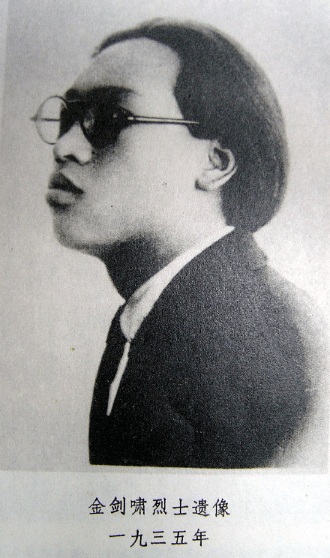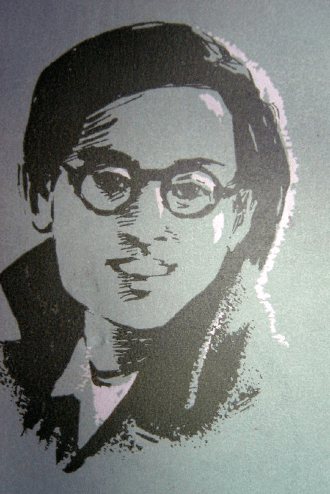Jin Jianxiao, a Manchu, was born in December 1910, in Fengtian奉天 (present-day Shenyang 沈阳), Liaoning 遼寧province. His original name was Jin Chengzai 金承載, his courtesy name was Peizhi 培之, and pseudonym Mengchen (夢塵); pennames included Jianxiao 劍嘯, Jianshuo 健碩, and Balai 巴來. He was born into an engraving worker’s family in Fengtian and moved to Harbin at the age of three.
In the summer of 1929, Jin went to Shanghai Xinhua University of Arts, Graphics Department 新華藝術大學圖工系to study fine arts. During this period, he was exposed to progressive publications and the CCP. He participated in struggles against school authorities and various unreasonable phenomena in the society at that time, and anonymously posted the Sanjiao bibao三角壁报 (Triangle poster) to expose the darkness of the school and society. Subsequently, the school ordered him to withdraw from school on the grounds of “incomplete enrollment procedures.” He exposed the principal’s retaliatory behavior, which made the principal unreasonable and had to agree to transfer him. The following year, he transferred to the Department of Graphics and Engineering of the Education Department of Shanghai University of the Arts. While studying painting, he also participated as an actor in the Nanguo She 南國社 (South country society) founded by Tian Han 田汉and others. At the same time, he joined the Modeng ju she 摩登劇社 (Modern Drama Club) organized by Zuo Ming左明 and others. In the spring of 1931, Jin joined the CCP in Shanghai and soon returned to Harbin.
Jin carried out anti-Japanese activities in Manchukuo. On 10 June 1936, Jin published the news that the Soviet proletarian writer Maxim Gorky (1868-1936) was seriously ill in the pictorial, which attracted the attention of the authorities. On the afternoon of the 13th, he and his colleagues were arrested and imprisoned by Japanese undercover agents. On the morning of 15 August 1936, Jin and four other patriots were executed in Qiqihar齊齊哈爾。
In the autumn of 1932, Jiang Chunfang 姜椿芳, who was working in the Propaganda Department of the Manchuria Provincial Committee of the Party, became Jin Jianxiao’s associate. To expand the party’s propaganda, they and Luo Feng羅烽 worked together to create the supplement “Night Whistle” of Xinjing’s (present-day Changchun) Datong Bao大同報 (Great unity herald) in August 1933. A total of 23 issues were published before the publication was forced to cease publication at the end of the year. At the beginning of 1934, Yi Bai 弋白 (Bai Lang白朗 , Liu Li 劉莉) used the Guoji xiebao國際協報 (International association newspaper) to publish a supplement of 文藝 (Literature and Arts). By the end of 1934, 47 issues had been published and the publication was also forced to stop. Jin wrote a large number of poems, novels, plays, essays, and cartoons for these two supplements. In 1934, Jin was unemployed and worked as a short-term writer for the Commercial Daily of the Three Northeastern Provinces. Later, he worked as an editor for the Da Bei Xinbao Huakan大北新報畫刊(Great North New Newspaper Pictorial).
Due to the destruction of the Manchurian Provincial Party Committee, Jin temporarily took refuge in Qiqihar, the capital of Heilongjiang Province at the time, in the spring of 1935. The editor-in-chief of the supplement Wutian蕪田 ( of Heilongjiang Minbao黑龍江民報 (Heilongjiang People’s Report). During this period, he wrote a serialized essay Buguniao布穀鳥 (Cuckoo), and the first epic praising the Northeast Anti-Fighting League Xing’anling de feng xue興安嶺的風雪 (Wind and Snow in the Xing’an Mountains). At that time, only a few paragraphs were included in the “Wutian” section. The whole poem was published on the anniversary of Jin’s death. Bai Lang and Jin Ren 金人 published in Shanghai under the name of the “Night Whistle” series, with Jiang Shui 江水 (Jiang Chunfang姜椿芳), Luo Feng 羅烽, Shu Qun 舒群,Xiao Jun 蕭軍, Xiao Hong 蕭紅, and Seke 塞克.
As a dramatist, Jin co-founded the Xingxing jutuan星星劇團 (Star Troupe) with Luo Feng, Xiao Jun and others in the spring of 1933. Jin served as the director and stage designer, and composed the group’s song with Xiao Jun. After the troupe dissolved, Jin moved to Qiqihar and organized the Baiguang jushe 白光劇社White Light Drama Club). Jin wrote Huanghun黃昏 (Twilight) and Mu yu zi 母與子 (Mother and Son), which were performed by the Baiguang Drama Club.
In early 1936, Jin returned to Harbin and managed to buy the copyrights of the “Dabei Xinbao Pictorial” where he had been an editor. At that time, this art magazine was nominally a supplement to the “Great Northern News” run by the Japanese Yamamoto 山本. The person in charge was Sun Jusheng 孫菊生. Neither understood literature and art, and the magazine was facing the crisis of bankruptcy due to poor sales. At that time, publishers had to apply for approval level by level. Jin and his comrades paid Sun a monthly payment, but the magazine was actually edited by Jin. Jin and his comrades used all feasible methods and opportunities to spread anti-Japanese and revolutionary ideas. Jin used texts and cartoons in the Da Bei Xin Bao Huakan大北新報畫刊 (Great North New Report Pictorial) to mock Mussolini for launching an aggressive war against Abyssinia, insinuating and exposing the essence of Japanese militarism’s aggression against China. He also used words and cartoons to mock Chiang Kai-shek’s failure to encircle and suppress the CCP in the Jinggang Mountain four times; he compared the Republican army to a paper tiger and the Red Army to a mountain tiger.
On the evening of June 10, 1936, Jin ‘s most admired writer Gorky was seriously ill, making him very uneasy. He immediately withdrew several manuscripts from the art magazine he had just compiled, and replaced them with a few photos of Gorky and the telegram, Gaoerji turan bingwei 高爾基突然病危 (Gorky is suddenly critically ill), and also posted a photo of a Chinese student performing Yedian夜店 (Nightclub) in Tokyo. This alarmed the Manchukuo secret service, because at that time, as long as someone read Gorky’s works, they would become “thinkers”, and they would be killed if they were imprisoned. What’s more, they dared to publish Gorky’s photos and critically ill news in the newspapers.
From noon to night on June 13, Jin and his companions, even neighbors and visitors, were arrested by plainclothes police officers from the Higher Department of the Japanese Consulate General in Harbin. After several tortures, the enemy escorted him to Qiqihar because of Jin’s activities in Qiqihar. Jin was tortured in prison but was unyielding. Jin was executed on 15 August 1936, at the age of 26.
This biography is based on the work of: Yu Bin 喻 彬, text and images . 揭秘革命艺术家金剑啸被日本特务暗杀真相 (Revealing the truth about the assassination of revolutionary artist Jin Jianxiao by Japanese secret agents). http://blog.sina.com.cn/s/blog_4c5eeb4b0102vzji.html. Accessed 14 November 2021.
Translated by Norman Smith.
Bibliography
Examples of Writing
Image Gallery




